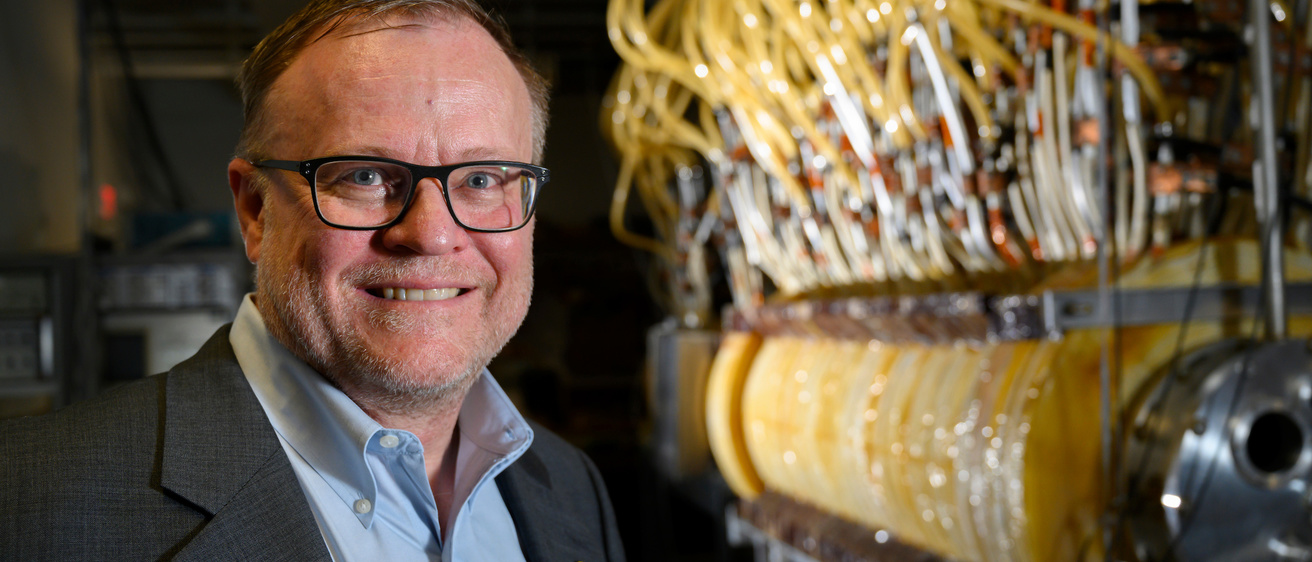J. Martin Scholtz knows firsthand the pivotal role research plays in a college education and career.
The new vice president for research at the University of Iowa was the first in his family to attend college when he enrolled at the University of Nebraska–Lincoln in fall 1980.
With no clear academic direction in mind, Scholtz decided to take a chemistry class geared toward majors in the field. Within a few weeks, his professor told Scholtz and several other students they needed to get more involved by joining a research lab.
“He pulled us aside, and he said, ‘You all are doing very well in the classroom. You need to start doing chemistry instead of just learning about chemistry,’” Scholtz says. “And, in many ways, I haven’t left the lab.”
Scholtz, who became the head of Iowa’s research enterprise in June, wants to expand research opportunities for students and explore creative ways to support world-class work by faculty in the arts, humanities, and sciences.
“Being involved in research was the seminal experience in my life,” Scholtz says. “I knew research and discovery is what I wanted to do. Before I arrived in Lincoln, I didn’t know what research was or whether it could be a career. That set me on a path that has led to here.”
Scholtz, who grew up in Hastings, Nebraska, joined a biochemistry lab as an undergraduate and studied the role of enzymes in certain cancers. The work earned him several co-authorships.
It was challenging at the beginning, though.
“I knew essentially zero biochemistry when I walked in the door,” Scholtz says. “The professor, Sheldon Schuster, gave me a biochemistry textbook and said, ‘Here you go.’ And, I read it thoroughly in my spare time.”
Scholtz graduated from Nebraska with a BS in chemistry. He earned his doctoral degree in chemistry from the University of California, Berkeley, in 1989 and performed postdoctoral work at Stanford University. In 1993, Scholtz joined the biochemistry faculty at Texas A&M University.
From the start, Scholtz included undergraduates in his own lab.
“Partly, I saw it as giving back,” Scholtz says. “I knew what impact it had on me, but I also knew it changes the dynamics of a lab, and it reminds us all one of the major reasons why we are research universities.”
Scholtz says he wants to build upon Iowa’s reputation for involving undergraduates in research in the arts, humanities, and sciences.
“These experiences are enormously impactful and, just like for me, career- and life-defining,” Scholtz says. “These are the types of experiences that research universities can provide, and we need to figure out how to give more of them to our students at Iowa.”
The Iowa Center for Research by Undergraduates (ICRU) came under the purview of the Office of the Vice President for Research (OVPR) earlier this year. That, along with closer coordination between OVPR and the Graduate College, is exciting for Scholtz, who says he wants to explore new ways to connect more students with researchers and scholars across the disciplines, “working not just in labs with benches and beakers, but in art studios and on the stage.”
“What I’d really like to do is continue the trajectory of integrating disciplines better and creating forums where people can come together and talk,” he says. “In my experience, the magic happens when you get faculty and researchers and scholars together talking about something. We need to think about how to bring these people together and how to find opportunities to support them so that ultimately, proposals and projects will be enriched by having a chorus of voices and thoughts.”
Scholtz says OVPR can encourage more ambitious collaboration, focusing on Iowa’s unique strengths and providing “customer-focused” support that eases the administrative burdens on investigators while ensuring research safety and integrity.
After 26 years at Texas A&M as both a professor and administrator, Scholtz sought a new challenge, and a return to the Midwest.
“The atmosphere and the culture here is one of collaboration, so that was a huge attractor to me,” Scholtz says. “We’re going to need to pull in social scientists, creative artists, engineers, physicians, scientists—really everybody—to tackle some of the grand societal challenges. I know Iowa can do that.”
